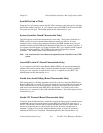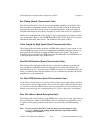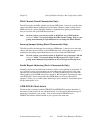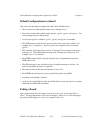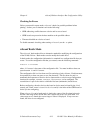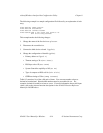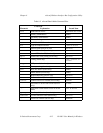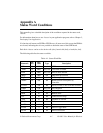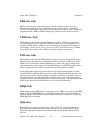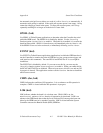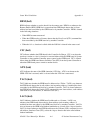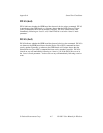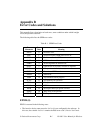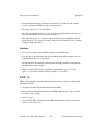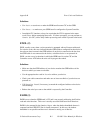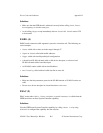Status Word Conditions Appendix A
NI-488.2 User Manual for Windows A-2 © National Instruments Corp.
ERR (dev, brd)
ERR is set in the status word following any call that results in an error. You can
determine the particular error by examining the error variable iberr. Appendix B,
Error Codes and Solutions, describes error codes that are recorded in iberr along with
possible solutions. ERR is cleared following any call that does not result in an error.
TIMO (dev, brd)
TIMO indicates that the timeout period has been exceeded. TIMO is set in the status
word following an ibwait call if the TIMO bit of the ibwait mask parameter is set
and the time limit expires. TIMO is also set following any synchronous I/O functions
(for example, ibcmd, ibrd , ibwrt, Receive , Send, and SendCmds) if a timeout
occurs during one of these calls. TIMO is cleared in all other circumstances.
END (dev, brd)
END indicates either that the GPIB EOI line has been asserted or that the EOS byte has
been received, if the software is configured to terminate a read on an EOS byte. If the
GPIB board is performing a shadow handshake as a result of the ibgts function, any
other function can return a status word with the END bit set if the END condition occurs
before or during that call. END is cleared when any I/O operation is initiated.
Some applications might need to know the exact I/O read termination mode of a read
operation–EOI by itself, the EOS character by itself, or EOI plus the EOS character. You
can use the ibconfig function (option IbcEndBitIsNormal) to enable a mode in
which the END bit is set only when EOI is asserted. In this mode, if the I/O operation
completes because of the EOS character by itself, END is not set. The application should
check the last byte of the received buffer to see if it is the EOS character.
SRQI (brd)
SRQI indicates that a GPIB device is requesting service. SRQI is set whenever the GPIB
board is CIC, the GPIB SRQ line is asserted, and the automatic serial poll capability is
disabled. SRQI is cleared either when the GPIB board ceases to be the CIC or when the
GPIB SRQ line is unasserted.
RQS (dev)
RQS appears in the status word only after a device-level call. It indicates that one or
more serial poll response bytes are waiting in the device’s serial poll response queue.
Automatic serial poll responses are not stored in the response queue unless they have
bit 6 set.



